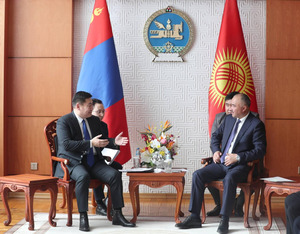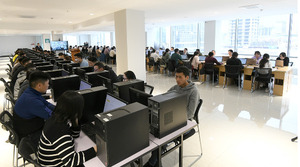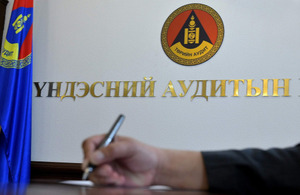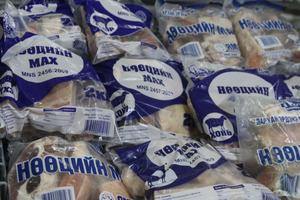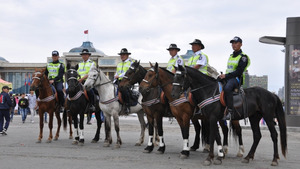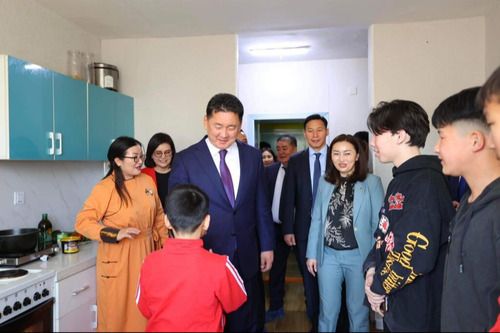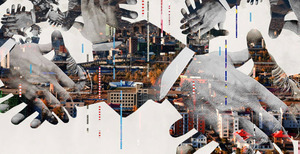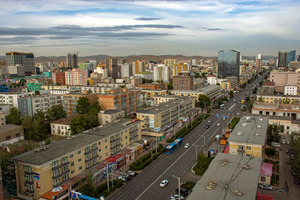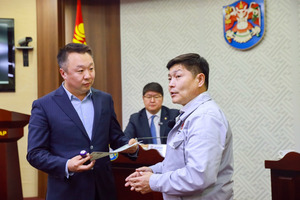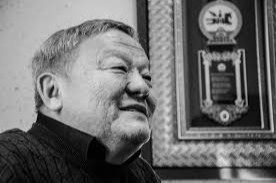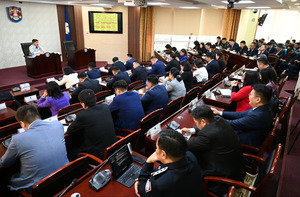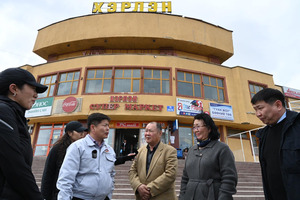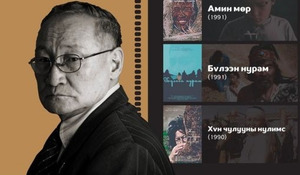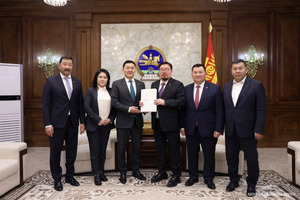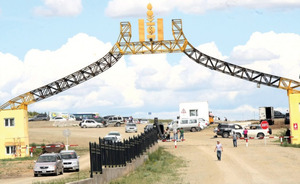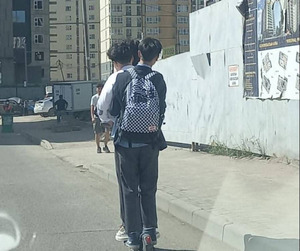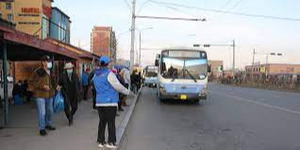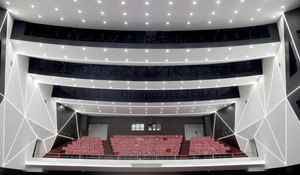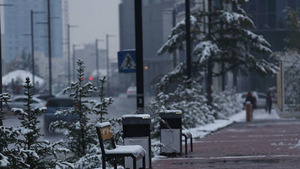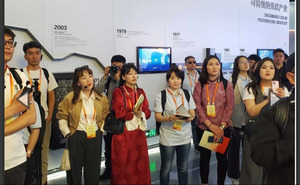A bold experiment aimed at turning an entire nation into stock investors is getting under way in a remote corner of the financial system: Mongolia.
Better known as nomadic tent-dwelling herders, Mongolians now are stockholders in a coal company that is one of the coming year’s hotly anticipated initial public offerings. The government has just given every Mongolian 538 shares in it.
The giveaway of stock in Erdenes-Tavan Tolgoi Ltd., popularly known as TT, is part of the government’s effort to prove to its people that they will be well-served by its decision to pursue large-scale mining in Mongolia.
That is a worrying strategy for some here because, beyond concerns such as environmental effects and the distribution of the wealth, it fundamentally ties the proudly independent country to the commodity appetite of its giant, often-resented southern neighbor, China.
Under Genghis Khan, the Mongols 800 years ago overran China and much of Central Asia, plundering as they went. Now, the globalization strategy of Mongolia includes digging up coal and copper to satisfy the region’s superpower.
Across the border in China, the region called Inner Mongolia has been the scene of strife that is traceable partly to a similar surge in mining. There were protests this week by ethnic Mongolians who see their traditional herding way of life threatened by mining to serve the Chinese industrial machine.
Mongolia, which is democratic, hasn’t seen any equivalent protests. In Ulan Bator, Mongolians say they are sympathetic to their ethnic kin across the border but confident they will be able to influence the mining sector at the ballot box during next June’s parliamentary election.
So far, what Mongolia is feeling from the minerals boom is mostly a Chinese-style economic sizzle, including bubbling inflation.
Mining money is pouring in. And so much more is expected, according to the International Monetary Fund, that the country’s economy, growing at a torrid pace of about 10% this year, could expand at almost a 23% rate in 2013.
The stock market has soared over much of the past year, property investors are in a frenzy and the central bank is battling upward pressure on the currency, the togrog, as foreign investors rush in.
“In the past we had no money,” says Ganhuyag Chuluun Hutagt, vice minister of finance. Now, “we are seeing capital come into the country, and the challenge is to manage that capital.”
An index of urban consumer prices was up 4.2% in April from a year earlier. The IMF has projected that inflation could hit 20% by year-end.
The country’s president, Elbegdorj Tsakhia, spoke for many Mongolians when at a recent conference he posed the question: “Is it a blessing or is it a curse that we are endowed with minerals in Mongolia?”
The coal-company shares being distributed to the citizenry will eventually trade on the Mongolian Stock Exchange, whose Top-20 Index leapt 138% last year and doubled again through late February, before a pullback that still leaves it up 27% for 2011.
The government’s efforts to make sure the boom is felt widely include a suite of gifts in addition to the coal-company shares. Another recently enacted scheme gave each Mongolian citizen a one-time $55 cash payment, followed by a $15 monthly stipend—payments that have helped spur consumer spending in a nation where per capita annual income is about $2,000.
Standing in an outdoor market in Ulan Bator, Nasauboyar said she was benefiting from the government largess. Sales were brisk on a bright winter day in March as the shopkeeper shuffled her feet on the market’s floor of solid ice.
Yet Ms. Nasauboyar’s mainstay product, a $19 water basin, offered a reminder of the level of development in Mongolia. The sink is designed to be used in tents that lack running water.
Although Mongolia has a land mass equaling nearly half a square kilometer per person, there is a real-estate scramble in the capital, home to half the Mongolian population of 2.8 million.
The city’s outskirts are increasingly dotted with upscale housing, including a tract of U.S.style wood-frame houses. Still, two-thirds of the people in the grimy capital still live like Mongolians in the countryside—without amenities, often in tents.
A testament to the soaring property prices stands a short drive from central Sukhbaatar Square. It is a circular tent, known as a “ger,” standing behind a rusty corrugated-steel wall, where on a recent day two dogs were gnawing on sheep feet.
The ger is the new home of Munkhzul Davaa, a 30-year-old who says that despite her job as a mining-equipment saleswoman, a ger is what she can afford. A mortgage would have set her back $1,200 a month. But the ger—set up in a relative’s yard, heated with a wood stove and crammed with Ms. Munkhzul’s Adidas sneakers, refrigerator and double bed—cost only $1,450.
The 81 orange slats holding up the ger look brilliant, but her toilet is a frozen outhouse. “I’m not poor. I’m not rich. I’m in the middle,” she says.
Bankers predict that the public offering of TT—a coal company that isn’t yet producing coal—will give the miner a total value of $10 billion. That would make the shares that each Mongolian holds worth about $360.
One worry concerns what some are referring to as Mongolian privatization, version 2.0.
Two decades ago, after the country turned its back on Soviet-style communism, it won plaudits in the West for launching its stock exchange and privatizing hundreds of government companies. Their shares, too, were distributed free to the public.
Speculators quickly fanned out across the hinterland dangling cash in front of herders, many of whom happily handed over their blue and pink privatization vouchers. The asset rush created some of Mongolia’s largest personal fortunes, along with widespread public resentment.
Some fear that history will repeat itself with the TT share giveaway. During a recent conference featuring government and stock-exchange officials, a businessman named Bazarsad Jargalsaikhan won applause when he wagged his forefinger and scoffed, “We’ve been given many things in the past—worthless!”
TT’s executive director, Enebish Baasangombo, responded, “We have to be prudent with the IPO.”
In Ulan Bator, some analysts worryingly compare the stock market to that of Kazakhstan, where hopes about oil reserves drove the benchmark index up by a factor of 14 between 2004 and 2008, after which it plunged 80%. Four banks in the Central Asian country had to be rescued.
The Mongolian Stock Exchange is housed in a peach-colored building on the capital’s Sukhbaatar Square, which exchange officials nostalgically remember as a theater where, as children, they watched Russian cartoons.
On a recent day, trading began with the tap of a small hammer on a CD-size gong. With orders being phoned in to 50 or so floor brokers, several seconds passed before the first trade registered. It was for two shares of listing No. 460, Shivee Ovoo, a coal company.
The exchange has about 330 stocks, a majority of which have been listed for years but never trade. “The local exchange doesn’t properly represent where the Mongolian economy is now, not mentioning where it’s going in the future,” says Alisher Ali Djumanov, chairman of Eurasia Capital LLC.
Things are changing at the exchange, though. Authorities have awarded a three-year management contract to the London Stock Exchange to introduce new stock-market regulation, training and technology. Cross listings between the two markets may follow. Another change is the volatility of many of the stocks that do trade actively. The total value of the exchange’s shares crossed $1 billion for the first time amid last year’s surge. Exchange officials predict the figure will jump to $10 billion by 2015, and $40 billion by 2020.
The coal-company offering will be a huge one for this exchange. Hopes are high even though TT isn’t yet producing coal. What it has is a massive deposit in the Gobi desert estimated to hold over six billion metric tons of coal. The government is in the process of selecting an operator, expected to be a large, experienced mining company. Investor appetite has been whetted by the successful public offering last fall of a company that owns a smaller piece of the same coal deposit.
The stock giveaway credited 1.5 billion shares, equal to 10% of TT, to government welfare accounts of each Mongolian citizen. Another 1.5 billion TT shares are set aside for thousands of Mongolian business enterprises.
The government will sell about 30% more of the company in a global IPO sometime in the next 12 months, expected to be led by Goldman Sachs Group Inc. and Deutsche Bank AG. The rest of the company will remain government-owned.
A lock-up provision will bar individuals from selling their free shares for an unspecified time, Mongolian President Elbegdorj says, “in order not to repeat mistakes of previous privatization, when a few got major assets and most were left with nothing.”
Even so, would-be investors many mornings these days crowd the Mongolian Stock Exchange’s front entrance. Many say they have simply forgotten whether they still have accounts from the early-1990s giveaway.
The Wall Street Journal
